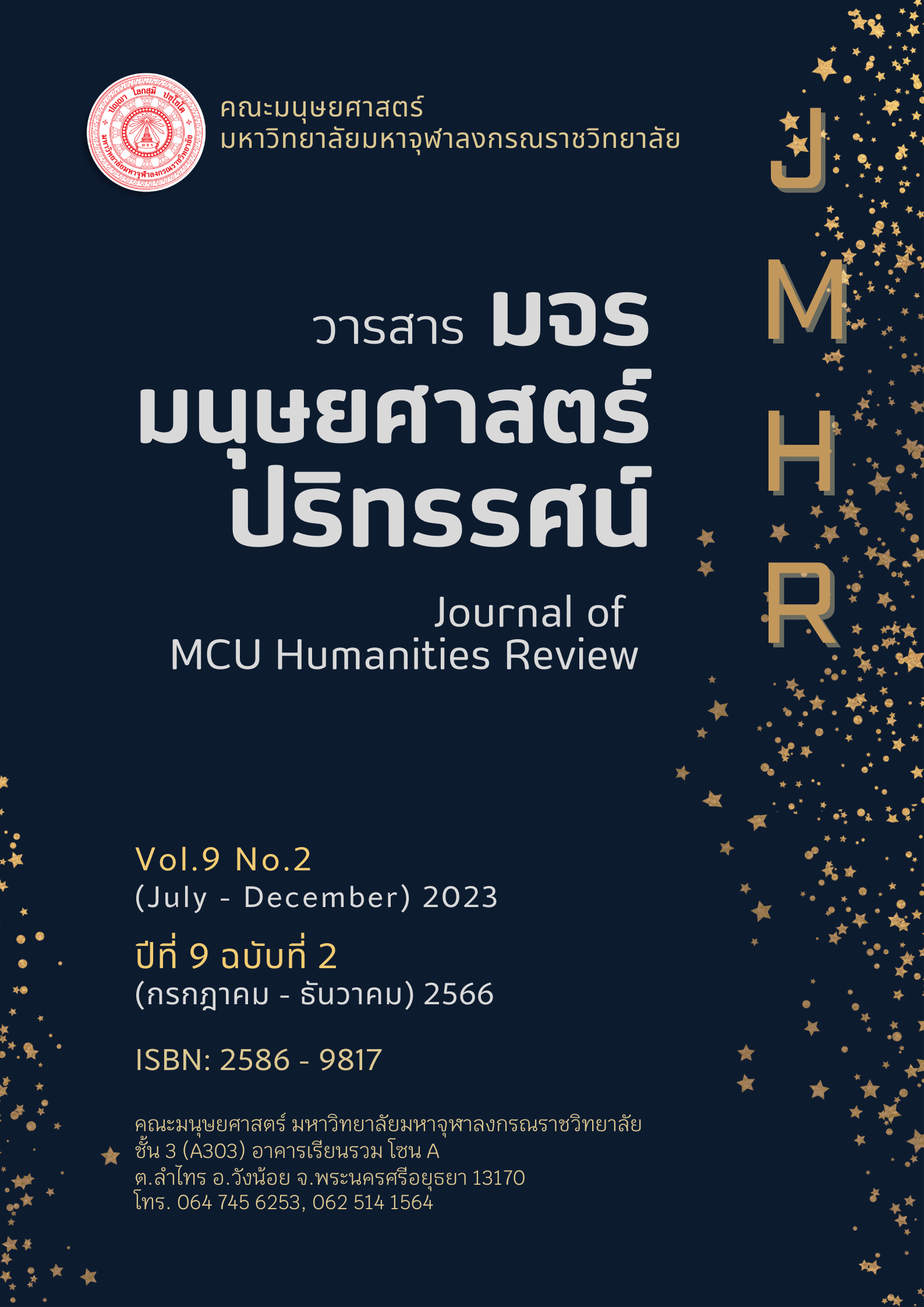รูปแบบการพัฒนาสุขภาวะองค์รวมในการทำงานอย่างมีความสุขตามแนวพุทธจิตวิทยา
คำสำคัญ:
สุขภาวะองค์รวม, การทำงานอย่างมีความสุข, พุทธจิตวิทยาบทคัดย่อ
การวิจัยนี้มีวัตถุประสงค์ 1. เพื่อวิเคราะห์คุณลักษณะสุขภาวะองค์รวมเพื่อการทำงานอย่างมีความสุข ตามหลักพระพุทธศาสนาและหลักจิตวิทยา 2. เพื่อสร้างรูปแบบการพัฒนาสุขภาวะองค์รวมในการทำงานอย่างมีความสุขตามแนวพุทธจิตวิทยา และ 3. เพื่อเสนอรูปแบบการพัฒนาสุขภาวะองค์รวมในการทำงานอย่างมีความสุขตามแนวพุทธจิตวิทยา เป็นวิธีการวิจัยเชิงคุณภาพ ใช้แบบสัมภาษณ์เชิงลึกเก็บข้อมูลจากผู้ให้ข้อมูลสำคัญ จำนวน 17 คน และการสนทนากลุ่มย่อยกับผู้เชี่ยวชาญ รวม 9 คน วิเคราะห์ข้อมูลด้วยวิธีการวิเคราะห์เนื้อหาและสร้างข้อมูลแบบอุปนัย
ผลการวิจัยพบว่า
- คุณลักษณะสุขภาวะองค์รวมตามหลักพระพุทธศาสนาและหลักจิตวิทยา ประกอบด้วย สุขภาวะทางด้านร่างกาย สุขภาวะด้านจิตใจ สุขภาวะด้านปัญญา และสุขภาวะด้านสังคม ทั้งสองหลักการมีสุขภาวะองค์รวมเหมือนกันโดยเป็นแบบองค์รวมและสมดุลคือทั้ง 4 ด้านมีความสัมพันธ์เชื่อมโยงกันแบบองค์รวมคือเป็นหนึ่งเดียวมิอาจแยกจากกันได้
- องค์ประกอบของสร้างรูปแบบการพัฒนาสุขภาวะองค์รวมในการทำงานอย่างมีความสุขตามแนวพุทธจิตวิทยา ประกอบด้วย 1) บุคลากรมีสุขภาวะองค์รวมที่สมดุลทั้งด้านร่างกาย จิตใจ ปัญญาและสังคม 2) มีการนำหลักพระพุทธศาสนาและหลักจิตวิทยามาบูรณาการเข้าด้วยกันเพื่อให้บุคลากรมีแรงจูงใจหรือมีแรงบันดาลใจในการนำหลักธรรมมาปฏิบัติให้เกิดความสำเร็จและความสุขในการทำงาน 3) การรู้ตนและครองตน การรู้คนและครองคน และการรู้งานและครองงานของบุคลากร ที่ต้องเข้าใจอย่างถ่องแท้ลึกซึ้งและสามารถครองตน ครองคนและครองงานในแต่ละเรื่องได้ และในแต่ละเรื่องของการรู้และการครองจะต้องมีสุขภาวะองค์รวมครบทั้ง 4 ด้านเพื่อนำไปสู่การเก่งดำเนินชีวิต เก่งคน และเก่งงานตามลำดับ 4) พุทธจิตปัญญาเป็นองค์ความรู้ สร้างสุขอย่างมีสติ ด้วยศรัทธาและปัญญา เป็นปัจจัยแห่งความสำเร็จของการนำ BMW-S Model มาใช้เพื่อการทำงานอย่างมีความสุข และเกิดสมดุลชีวิต
- รูปแบบการพัฒนาสุขภาวะองค์รวมในการทำงานอย่างมีความสุขตามแนวพุทธจิตวิทยา คือ รูปแบบ BMW-S Model เป็นรูปแบบการพัฒนาบุคลากรเพื่อให้เกิดความสุขในการทำงานโดยเน้นการพัฒนาพุทธจิตปัญญา พัฒนาทั้งจิตใจและปัญญา ส่งผลถึงสุขภาวะองค์รวมทั้ง 4 ด้าน คือ ด้านร่างกาย จิตใจ ปัญญา และสังคม และการทำงานอย่างมีความสุข
เอกสารอ้างอิง
ชมพูนุช ช้างเจริญ. (2558). ปัจจัยทางจิตสังคมที่มีความสัมพันธ์กับความสามารถในการจัดการความเครียดของคนวัยทำงานในตำบลคลองสี่ อำเภอคลองหลวง จังหวัดปทุมธานี (วิทยานิพนธ์พุทธศาสตรมหาบัณฑิต). มหาวิทยาลัยมหาจุฬาลงกรณราชวิทยาลัย. พระนครศรีอยุธยา.
พระพรหมคุณาภรณ์ (ป.อ. ปยุตฺโต). (2553). พุทธธรรม (พิมพ์ครั้งที่ 24). นนทบุรี: โรงพิมพ์เพิ่มทรัพย์การพิมพ์.
“_________ ”. (2557). สุขภาวะองค์รวมแนวพุทธ (พิมพ์ครั้งที่ 35). นครปฐม: วัดญาณเวศกวัน.
ธีร์ธรรม วุฑฒิวัตรชัยแก้ว, กฤษณา ลดาสวรรค์, ทรงวุฒิ อัศวพฤกษชาติ และ ปภัฎชมณ ฟูแสง. (2559). กลยุทธ์เพื่อเสริมสร้างองค์กรแห่งความสุข. กรุงเทพฯ: บริษัท แอทโฟร์พริ้นท์ จำกัด.
เรวดี วัฒฑกโกศล และ พรรณระพี สุทธิวรรณ. (2559). การพัฒนากิจกรรมการคิดทางบวกเพื่อสร้างเสริมการคิดทางบวกและความสุขของนิสิต. วารสารบรรณศาสตร์ มศว, 9(2), 76-86.
เศรษฐา มากล้น. (2559). ประสิทธิภาพในการปฏิบัติงานตามหลักอิทธิบาท 4 ของเจ้าหน้าที่ตำรวจในสถานีตำรวจ จังหวัดนครนายก (วิทยานิพนธ์พุทธศาสตรมหาบัณฑิต). มหาวิทยาลัยมหาจุฬาลงกรณราชวิทยาลัย. พระนครศรีอยุธยา.
สถาบันวิจัยประชากรและสังคม. (2562-2564). ผลการสำรวจความสุขคนทำงานในองค์กร (รายงานการวิจัย). กรุงเทพฯ: สถาบันวิจัยประชากรและสังคม.
Buckingham, M., & Clifton, D.O. (2001). Now Discover your strength. New York: The Free Press.
Burton, J. (2010). WHO Healthy Workplace Framework and Model: Background and Supporting Literature and Practices. Retrieved January 3, 2023, from https://www.who.int/occupational_health/healthy_workplace_framework.pdf
Oswald, A. Proto, E.J. & Sgroi, D. (2015). Happiness and productivity. Journal of Labor Economics, 33(4), 789-822.
Raymond J. Wlodkowski. (1993). Enhancing Adult Motivation to Learn. California: Jossey-Bass Inc.
ดาวน์โหลด
เผยแพร่แล้ว
รูปแบบการอ้างอิง
ฉบับ
ประเภทบทความ
หมวดหมู่
สัญญาอนุญาต
ลิขสิทธิ์ (c) 2023 วารสาร มจร มนุษยศาสตร์ปริทรรศน์

อนุญาตภายใต้เงื่อนไข Creative Commons Attribution-NonCommercial-NoDerivatives 4.0 International License.






